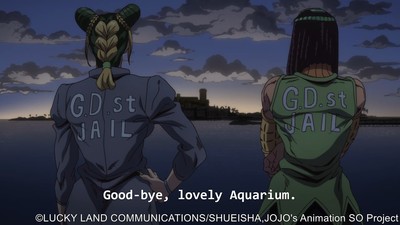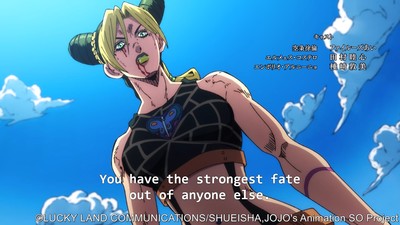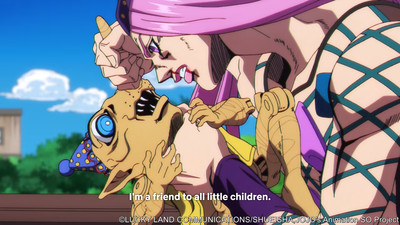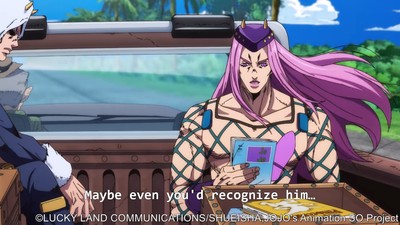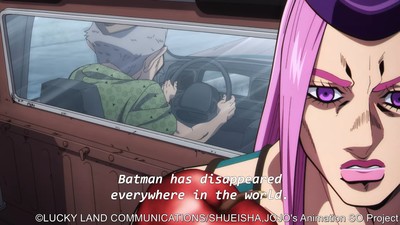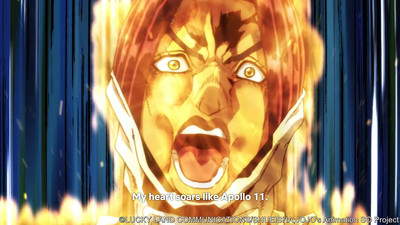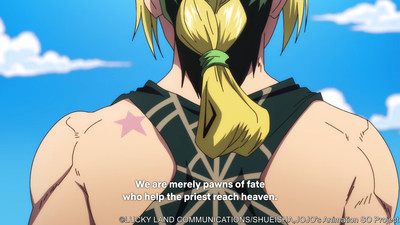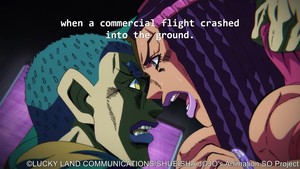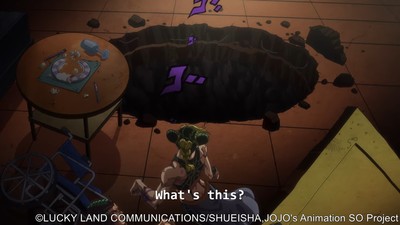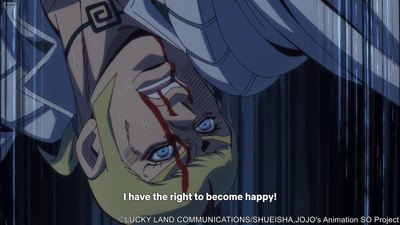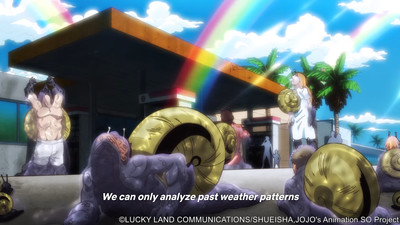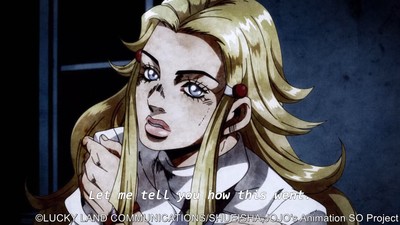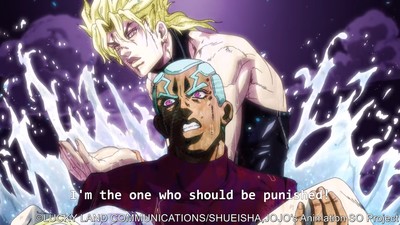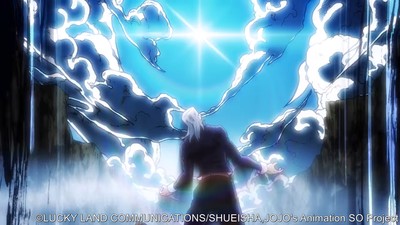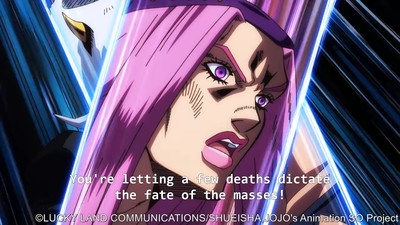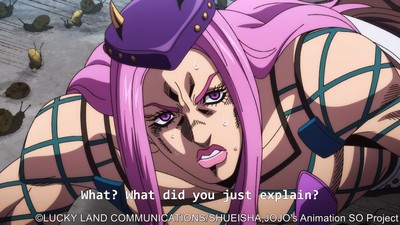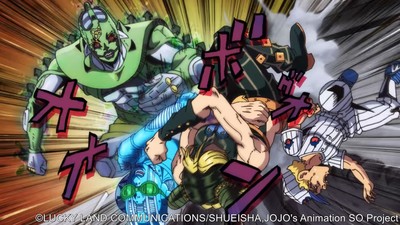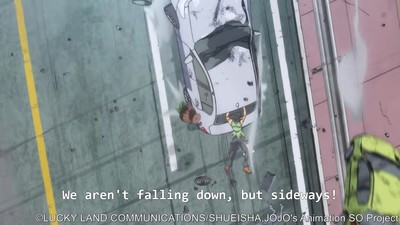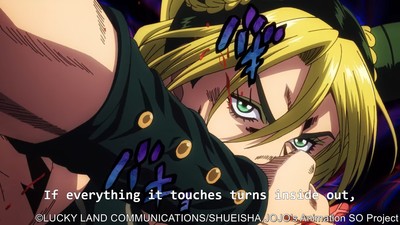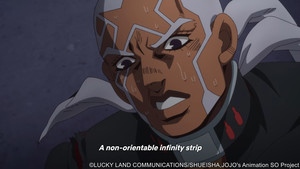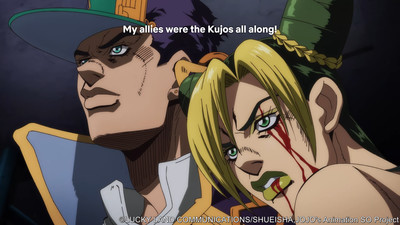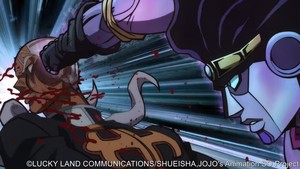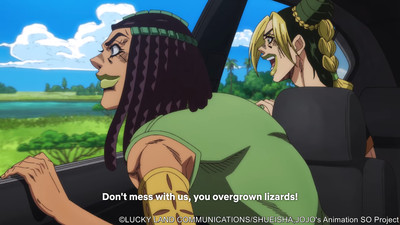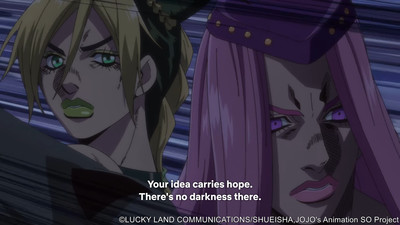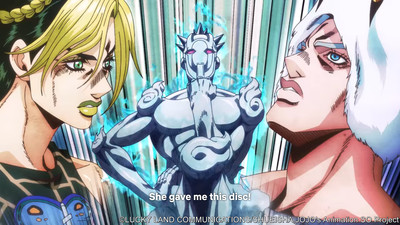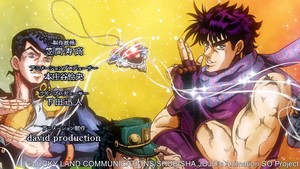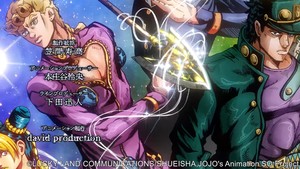Originally imagined as the end of the series, JoJo's Bizarre Adventure: Stone Ocean closes out with time travel, Vincent Van Gogh, and enough snails to make Junji Ito proud.
This series is streaming on Netflix
Disclaimer: The views and opinions expressed by the participants in this chatlog are not the views of Anime News Network.
Spoiler Warning for discussion of the series ahead.
Chris
Well, Nicky, it took three months, but we finally did it: We, and JoJo's Bizarre Adventure, successfully broke out of Netflix Jail! At last, we can take the final stretch of this show on the road!

Nicky
Yes! All 38 episodes of the sixth incarnation of
Jojo's,
Stone Ocean, are finally available to viewers with a Netflix subscription. What sweet freedom it is to view the whole thing now. Previously, Chris and I had a fulfilling
discussion over the last batch. There, we discussed some of the wild themes and theories we had about what
Part 6 was trying to do. Now, we'll test to see if any of that holds water or falls apart under the weight of gravity.

Before we dive down into the series itself, it's worth reiterating what a fumble the Netflix binge-model release for this show was. Notably, this last stage of
Stone Ocean is a significant moment for
Jojo's, marking the end of the originally planned last part of Hirohiko Araki's Joestar saga. And instead of exciting communal consumption of each episode every Friday, here we have the final fourteen eps blurted out unceremoniously onto a streaming platform. We, the people, deserved real-time reactions to stuff like Anasui and Weather Report dealing with copyright-skirting cartoon characters, and we were robbed!

I thought the middle batch had some wild moments, but this section really takes the cake as some of the biggest, strangest, and most intense stuff I've seen from the series that appropriately labels itself "Bizarre." While I enjoyed binging this and the previous set as cohesive sections, I wish it didn't happen as a blow to the fanbase. I knew a bit about
Part 6 going in, but it's a very different thing to experience, mainly how it carries the weight of its predecessors.

The previous section of
Stone Ocean seemed all set on exemplifying the growth and change that characters like Jolyne and the others experienced via their trials and tribulations through the Florida corrections system. And there is still plenty of that in this last third for others. But that reflection also now stretches clearly into past generations and beyond the future, and the question of how predetermined we can afford our destinies to be.

If you may occasionally forget that the focus on fate is going to be a primary one, don't worry, as this stretch of the show will be happy to remind you of it with accelerating frequency.
It's worth mentioning that some of these ideas aren't unique to
Part 6. Races against time and fights against destinies have been reoccurring throughout the Joestar bloodline. Still, it's at the forefront in
Stone Ocean as preached by the central antagonist, the DIO-devoted priest, Pucci.

It becomes fascinating in concert with this one's particular placement: There's the question if one's destiny can be knowable and pre-determined and whether that's desirable. The irony is that this is all happening in a story that has already been plotted out and pre-determined (original manga-publishing freewheeling by Araki aside). So, of course, the first Stand battle of the section sees the characters dealing with literal (in the most literal sense of the word) embodiments of well-known stories and their established outcomes!

After hearing that Jolyne, Ermes, and Emporio had wheeled their way out of the women's prison, allied Stand users Anasui and Weather Report (Weather Forecast in the Netflix subs) break out to follow them. Anasui hasn't given up on his fixation on marrying Jolyne, and Weather Report is determined to find the truth about his memories from the man who took them. While attempting to stay low, they hitch a ride with an elderly gentleman but are quickly pulled into a world of fun and fancy-free from Bohemian Rhapsody (Bohemian Ecstatic), a Stand that manipulates and traps people into the world of fiction.

Meanwhile, Pucci is on the move toward Cape Canaveral to complete the next process of his plan to reach Heaven on the night of the new moon. On his way, his cab suddenly stops before he gets stalled at a nearby ER center, where he encounters three men who all happen to be illegitimate sons of DIO.

Of all the twists this one goes through, that's the least surprising. Indeed, Giorno didn't represent the only time DIO got busy with Jonathan's body.
Given how DIO sensually touches Pucci's hand the first time they meet, I'm pretty sure the guys we see in
Part 6 were just the results of DIO's "Night Time Florida Cruise" on his way to some theme parks. Y'know, classic vampire stuff.

Careful talking about theme parks. This anime already had to go one step beyond the usual legal loopholes of musical mentions in officially subbed
Jojo's and scrub out all instances of Anasui's other true love besides Jolyne!


I can't believe Anasui will fight Riku from Kingdom Hearts over who gets shipped with Mickey Mouse.
Forget the Joestars vs. DIO. The true eternal battle of
Jojo's will always be between Araki and copyright law.

You'd think this fight with Bohemian Rhapsody and its ability to manifest famous characters would be the most blatant case of this riffing in
Stone Ocean, but I can assure you, it is not.

Anyways, characters start going missing, and people who recognize them get their consciousness drawn into the fantasy realm as they subconsciously yearn to be a part of it. Anasui gets pulled in, but Weather Report, a man with no memories before prison, remains unaffected. This leaves them unable to speak to each other. Eventually, Weather, Anasui's consciousness, and Anasui's physical body all end up separated.

I love how Weather's complete pop-cultural illiteracy initially renders him invulnerable to the Stand's attacks.




It doesn't last, of course, because this is
Jojo's, and bullshitting our way into and out of situations is the name of the game, but it's an amusing intersection of character and conflict detail for the moment, all the same.
It was interesting to me as a primarily Anasui-focused problem, given how it's a story about being shoved into defined roles, such as a wolf destined to die a gruesome death for his crimes. Anasui isn't very moral, but many characters in
Part 6 are defined by their struggle to rewrite their narratives against misfortune. Just as they are about to die, Weather Report uses Picasso to draw a new original hero who puts all the other characters back in their place, ending the story.

So while it's short, it's an interesting set-up to keep in mind as characters get told repeatedly that things have to be a certain way, and there's no use fighting against it!
Exactly. I can see some regarding Weather's solution as cheap, but it fits with that overall thematic vibe of
Stone Ocean here.

Anasui's past shouldn't mean he's doomed to play the part of the Big Bad Wolf of a story. Similarly, Jolyne finds out that Romeo, the bad boyfriend who originally helped sell her up the river, actually felt genuine guilt over his actions, and he's now working to atone for it!




People can change, and it shouldn't even take jail time for that to happen!
Though, they still silence his tongue for good measure and great comedy.
Even DIO's sons seem to go along with Pucci's plan as they feel it is a means to change the course of their lives. While Giornio had a bit of an unhappy childhood, it's interesting to see mirrors of him that aren't blessed with that sweet Main Character energy nor blessed with DIO's determination, even if they might have similar ambitions.
Case in point: Our poor boy Rikiel. His Stand power (Sky High, very amusingly renamed Sky Guy for the subs) doesn't have a lot to do with that ol' fate/destiny theming, just being the ability to control cryptids called Skyfish or Rods. But the guy himself makes up for it with how his power affected him, making him believe he was doomed to be chronically ill and suffering because of that forever, before learning to control his daddy DIO's gift turned his life around.

Just think, had he defeated Jolyne here, he could have gone on to fame and fortune simply because he could prove cryptids exist.
He also brings up the idea of humanity's desire to go beyond themselves, like astronauts reaching the moon, and both he and Jolyne set themselves on fire to maintain their body heat. WHY AREN'T YOU GETTING BURNED?!

It's the simplest Stand battle in this whole segment, yet still one of the most absurd.

Like only in JoJo's Bizarre Adventure are you getting confidently-delivered lines like this.
Rikiel proved challenging, but in the end, Jolyne made it out, possibly due to luck. His hand protected her from being attacked by the Rods. The anime leaves it up to interpretation, whether it's fate or chance. Accepting his loss in the grand scheme of things, he gives Jolyne some crucial information and that their own ally, Weather Report, is actually Pucci's brother. Another twist of fate!

Underworld is a pretty metal Stand that traps Jolyne and Ermes in a hole in the center of the ER, where they're suddenly trying to recreate the survival tactics of a crashed airplane. But as much as Underworld is supposed to be about set outcomes, Versus is a hypocrite who wants to turn back the hand Fate dealt him. Like Rikiel, Versus had a pretty shitty life partially due to his inability to control his Stand. So, unfortunately, Araki decided to wholesale include the beginning of
Holes.

And that is the bit I foreshadowed earlier about one of the most blatant cribbings I've seen in
Jojo's. I legit wound up yelling, "It's just
Holes!" when we got the bit about Versus's backstory.


It fits, as
Holes is also a story about interconnected generational struggles and fate as a force driven by imperceptible coincidence. And also precludes Versus's Stand power based on, well,

digging holes.
See, it's unfortunate because now I think someone should pay the Jojo's actors to sing the Holes rap from the Disney movie, and that's all my brain can think about.
Me, I'm imagining the world where Araki wrote
Stone Ocean after that movie version of
Holes came out, and Versus was explicitly designed to look like Shia LeBeouf.
What we get does at least result in plenty of amusing, hole-based dialogue.

This is what I get for snarking about all those mentions of DIO's bone in the last part.
It's also hilarious that even though Versus is supposed to be Pucci's minion, Pucci does nothing but berate him while praising his enemies the whole time, causing Versus not to be very happy and decide to stop taking orders from someone else and seize heaven for himself. As a counter, he takes Weather Reports memory disks and unleashes a series of deadly rainbows!


Oh man, these rainbows. Underworld was a decently neat Stand power that tied in with the overall theming of railing against predetermined events, surviving the outcomes of stories like Bohemian Rhapsody. These Rainbows? That's 'Heavy Weather,' Weather Report's ultimate, automated Stand attack. It probably says something that this was one I heard most about before completing
Stone Ocean.


Like just what it does feels like Araki consciously trying to out-Bizarre himself, and that's before we even get into how it supposedly works.
While Bohemian Rhapsody was probably one of the largest ranged Stands we'd seen, covering the whole world and probably trapping many innocent random people, Heavy Weather, compared to other Stands, has an even more insane body count--Err, Snail Count? Pretty soon, everyone in the whole city starts feeling sluggish.

The snail scale of that is an important feature, too. Weather's powers have gone out of control like this once before and similarly gastropod-ifyed a whole town. Before we even get the entire backstory behind his missing memories, we understand why sealing them away might have been a necessity at the time and get an idea that whatever happened to drive him to this probably wasn't pretty.

Using the distraction to his opportunity, Versus gets away in a mad dash to try and obtain Jotaro's memory disk before Emporio can deliver it to the Speedwagon Foundation. Stuck between some shells and a hard place, our gang has no choice but to let Pucci slip by again. However, it takes a lot of work to rush to save your friends when you're slowly turning into a snail.
It's, uhh, a lot. Like, a lot, a lot. As we mentioned, Pucci and Weather are brothers. Fraternal twins switched at birth when a random Southern woman as if going against fate, swapped her dead baby with who would become Weather. While her crime went unnoticed for 15 years, she eventually confessed her sins in private to a young Pucci in the clergy while attempting to reconcile whether she should tell her son the truth before she succumbs to illness.


Like, okay, not great, but at least she got the info out there somewhere. Pucci needs to mull this revelation over and decide how to break it to his parents and younger sister, and it's not like anything could complicate—


—Awwwww, nuts.
Circumstances dictated that Weather, actually Wes, had unknowingly gotten involved with his biological sister, Perla, after he managed to stop a purse-snatcher dead in his tracks. Still believing himself a good person, Pucci does the incredibly normal thing and hires a shady P.I. to break them up instead of handling it directly.

Only, it just so happens that Wes's adopted mother married a Black man and that the P.I. happened to have ties to a group of zealots (the goddamn KKK), and they go on to lynch Wes based on a misconception while Perla watches. Afterward, Perla throws herself into the lake, unaware that Weather/Wes has survived.
I mean, here's another bit that's not that far off from
Holes, being a tale of astonishingly unfortunate coincidences intertwined with historical American racism.

I can see what Araki was going for here, tying two of this story's most driving characters into evils unique to the setting for
Stone Ocean. And as bananas as it is to have the revelation rooted in switched babies, accidental incest, and, we cannot overstate, the actual Ku Klux Klan, it does track for the kinds of extremes that could drive Pucci to his eventual agenda, as well as provoke Weather to manifest the whole snail-rainbow disaster.


It almost does provoke proper sympathy for Pucci. I can see why he might've preferred the ability to know and account for every potentially disastrous variable in the lives of himself and others
It's a little bit of Greek tragedy; anyone that tries to defy their lot in life gets punished fourfold, making you feel bad for everyone, and prompting you to think if it was better if no one had ever gotten themselves involved. One woman's inability to accept grief turned into destroying another family, a whole town, and maybe even the entire universe.
Perhaps appropriate for a story that all started way back with the unexpected consequences of an unexpected carriage accident.


Speaking of cars, coping with their lack of non-slimy appendages, Jolyne and Co jack a car and drive off with a defeated Versus to find Weather and Pucci. It turns out Pucci knows how to avoid Heavy Weather, having dealt with the phenomenon before and observing a blind woman be perfectly unaffected. It turns out those rainbows are just full of subliminal messages telling you to become a snail and triggering metamorphosis!

Because that's how science works, yes.
While the intense backstory behind it mainly works for me, the actual mechanics of Heavy Weather are one of those
Jojo's bits where I have to throw my hands up and say, "Whatever." I don't know that it's quite as bad as Vento Aureo's infamous Brick Snake, and I at least appreciate the scale and severity of the disaster it presents. But this one feels like Araki is winging it more than usual.

Still, I can mostly roll with it because the resultant battle makes for an adequate send-off to Weather and the multi-stage climax that follows is a bit more sensible. By
Jojo's standards, anyway.
The presentation feels like it's stepped up, comparatively. That soundtrack's a component (including a nifty new OP that I admit took a while to grow on me but feels indispensable by the end), and even though
Stone Ocean remains the less animated
Jojo's anime, this one still has its moments, and things feel like they stay a bit more on-model throughout.

There's just that much indulgence in the classic sound-effects-manifesting splashes, to say nothing of reveling in the ol' body horror.
Oh, you mean like the body horror of having parts of your body turned inside out due to "gravity?"

Honestly, as someone with severe fear of heights, who's had multiple recurring nightmares about unrealistically steep-driving car mishaps, that bit was less freaky to me than the preceding uphill race to Cape Canaveral.

Besides, Jolyne's initial response to the whole turning-inside-out thing leads to one of the rawest parts of any fight and further proves that she is Jotaro Kujo's daughter.


Again: Still better than Brick Snake. I like it because it fits with the idea of Jolyne (and, through her, Araki) having to come up with creative uses for such an ostensibly simple power. I can at least follow the train of thought here compared to "Subliminal Message Snail Rainbows." Most importantly, it looks super cool.


It's a great effect and gives juuuust enough time for Jotaro to arrive along with Ermes who fell out of the car earlier. Unfortunately, this also gives Pucci enough time to have a revelation to complete his master plan a bit earlier than stated.


It's a great big hero moment! Though, it's also part of what makes it scarier when Pucci manages to dodge one of Star Platinum's attacks, getting a glimpse of stopped time. It's a small recognition of Pucci's oncoming insane power creep. As viewers, we know Jotaro is OP, but watching him scared shitless of Pucci's final form settles the stakes. After all, stopping time doesn't do anything if time starts rapidly accelerating.
Just before that punchline, while watching, I said, "I'd bet Rohan could handle that." So it's nice to know I'm at least on Araki's wavelength when it comes to stupid referential jokes, if not explanations of Stand ability logic.
Moments like this are weird and don't always land, but they're part of what makes
Jojo's unique, showing the situation's horror while also emphasizing its ridiculousness. Some may argue this ruins the tone, but it wouldn't be
Jojo's if it was all serious and bleak all the time.
Even after Weather died, we still had stupid bits about gators and Jolyne tossing an expensive ring that Anasui tried to give her.

I never laughed so hard as seeing Jotaro be dumbfounded at what was a heartfelt attempt.
It exists at the specific intersection of Jotaro's personality we know so well by this point and that he only just got here, thanks to how this story came together. And it's one of those kinds of idiosyncrasies that sell the stylings of the series. I like
Jojo's specifically because you consistently get the sense of Araki screwing around in this bizarre sandbox he created. So even at the culminating climax of this six-part journey, you can still count on indulgences in things like dubious marine biology factoids.


But I also bring it up because although it sometimes pokes fun, there's some reassurance there too. The final standoff only works because everyone sticks together. They all contribute and never lose faith in each other. Anasui saves Jotaro from a fatal blow using Diver Down and makes himself Pucci's primary target, later offering to risk himself completely to stop Pucci if it means the slim possibility of success and making his selfish dream a reality. In a surprise turn of events, Jolyne agrees to it as something to look forward to.

It is its own delightful moment, catching me as completely off-guard as Anasui. And it fits when you think about it: Pucci's whole scheme is about consigning humanity to a world where they're entirely, constantly aware of the events that will lead them to their fate. Jolyne and the others, by contrast, see value in the hope of the potential, anticipating the unknown and the possibilities of the future.

Even if your destiny is the result of unavoidable cosmic coincidence, you can still find the drive from believing you can keep trying to change things up to the very end.
Pucci is always two steps ahead of the plan, and everything seems bad. We watch everyone's corpses turn to dust in the water as time continues to accelerate past the point of no return and into the next universe, where time will now play out again with everyone aware of their eventual outcomes, Pucci's idea of true happiness. It feels like he's won, but because of everyone's sacrifices, Emporio managed to survive the reset, a snag for Pucci, causing him to slow down time to the year 2011 to finish the job back inside the prison.

Even apart from everything else
Stone Ocean has done, it comes off like quite a swerve! Wholly killing off our titular JoJo, and leaving the last hope for the fight in the hands of a supporting character instead. This may make plenty of sense since the strength of the Joestars has long laid in their connections; going back to that time Jonathan won Speedwagon over.

Emporio might be the weakest cast member, but he's been good at surviving the whole time. And what's more, Jolyne had left him with a souvenir: Weather Report's disc! Pucci hadn't obtained the ultimate power yet, so while he initially underestimates him as another insignificant being who should cosign themselves to fate and the power of destiny, he's pretty handily handed by a kid who believes in justice, causing time to unravel back from the reset.


It feels like a fitting culmination of all of Pucci's enemies finally catching him with a way to finish him off. And it was ironically only possible due to Pucci's disc-downloading ability! It also comes off as the last leg on that whole character growth element of
Stone Ocean. Emporio goes from a scared kid who spent years hiding in the walls of Green Dolphin Street Prison to being the one to take Pucci down within that very hiding place!


Even though Emporio made it out, Pucci mentioned that the dead did not travel to the new timeline. For example, that universe's Jotaro and Jolyne were only imitations and not them. With Pucci's defeat, everything they've worked for paid off, but we're left uncertain whether our heroes will live again to see the new future they created. Could this be the end of the Joestars like Pucci wanted?
I will say that the Not-Jolyne and Not-Jotaro threw me since I thought it might just be the return of the old rougher
Stone Ocean quality control.


Well, the reset of the reset gave all the animators extra time to be on model again, with new fashion!

And maybe a tweaked name here and there.


Ermes and Weather make it through too, and it all makes for a bittersweet way to say goodbye to this corner of the Joestar universe: Soft-rebooted into a version where everyone's doing just a bit better, no ancient vampire blood feuds or inexplicable abilities stressing their lives.
Their previous lives may be gone, but their echoes are still there. Ermes mentions her sister, Irene, and Anakiss are dating and hoping to get married. None of them are in prison. They even pick up a hitchhiker who looks like Weather Report along the road. When Emporio cries out of relief, I can't help but cry, too. It's really sweet to see that kind of weight lifted from them. No longer are they held down by so-called gravity. Fate and destiny play a part in this outcome as much as the characters' motivations, actions, and determination to see things through. But most importantly, the thing drawing them together is, of course, their feelings. Just like how my feelings for
Jojo's keeps me coming back for it.

After all this time, it only seems fair that
Stone Ocean is playing to the folks who have been in for the long haul. They even bring "Roundabout" back for one last hurrah at the end of this finale in a perfect, crowd-pleaser of a move.

I'll be shocked if we don't see Steel Ball Run animated sooner rather than later, but regardless of that one, the way this loop closes makes it clear how
Stone Ocean was meant to be the ending of the original, overall story. And it's immensely satisfying to watch it animated across its airing. Even if we were stuck with these Netflix binge drops for the last stretch.
I wasn't sure how I'd feel about this ending from what I heard about it, but now that I have experienced it, I think it's my favorite
Jojo's. I think it's the strongest part thematically and the most emotional I can remember being over
Jojo's in a long time. Araki has grown as a storyteller and improved throughout the journey. It's something you have to see to get, but overall, it made me feel hopeful trying to see all these people try so hard to make a world where they can be happy.




 @Lossthief
@Lossthief
 @BeeDubsProwl
@BeeDubsProwl
 @NickyEnchilada
@NickyEnchilada
 @vestenet
@vestenet
